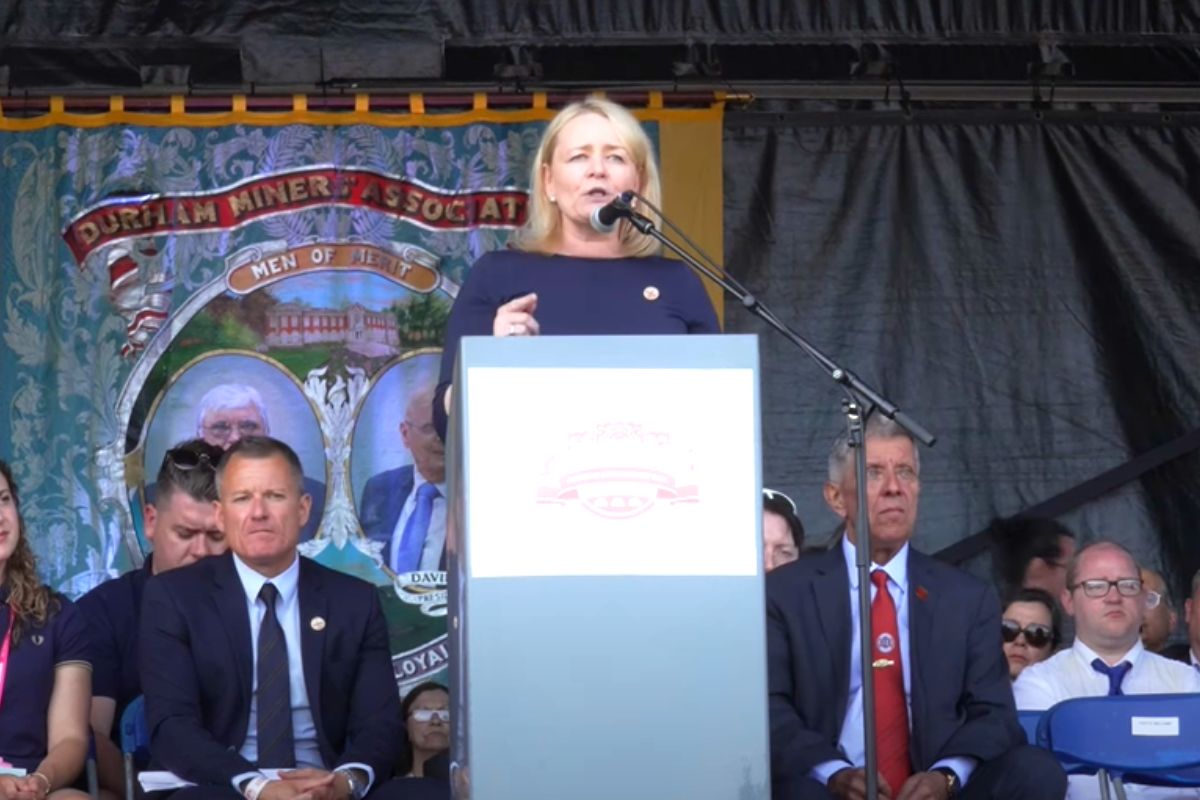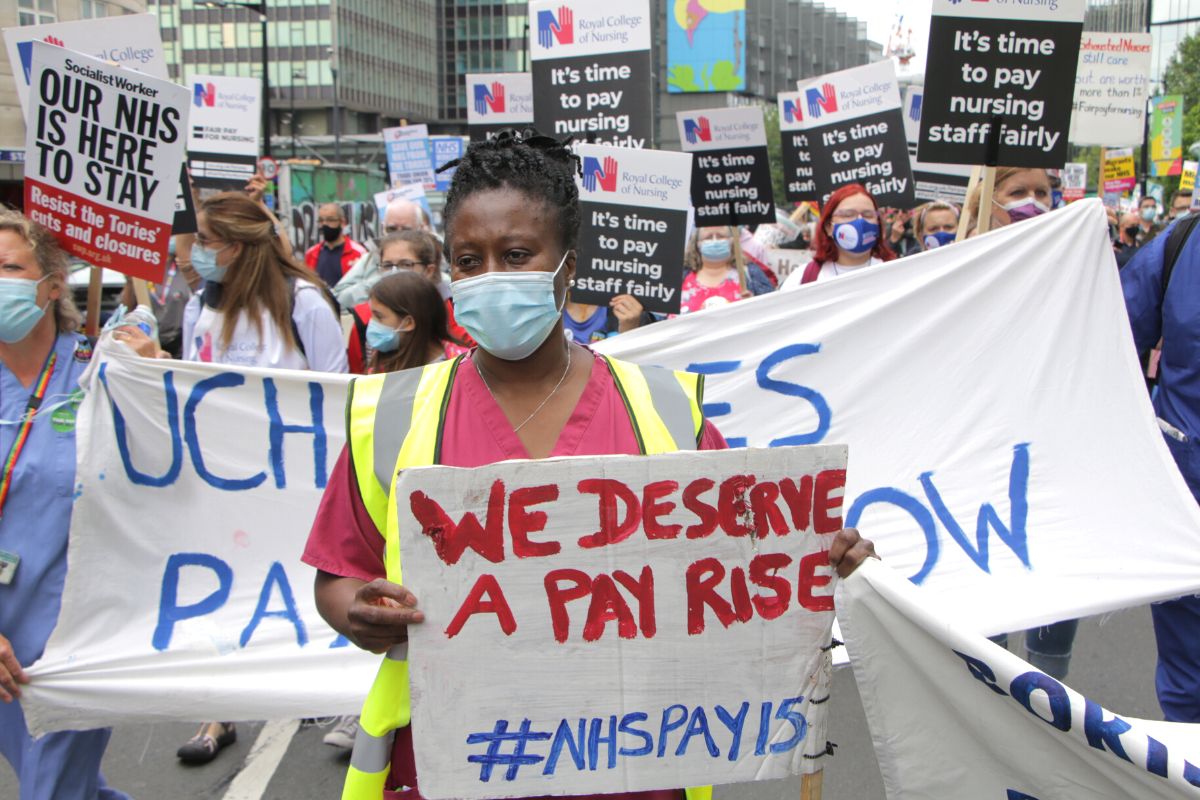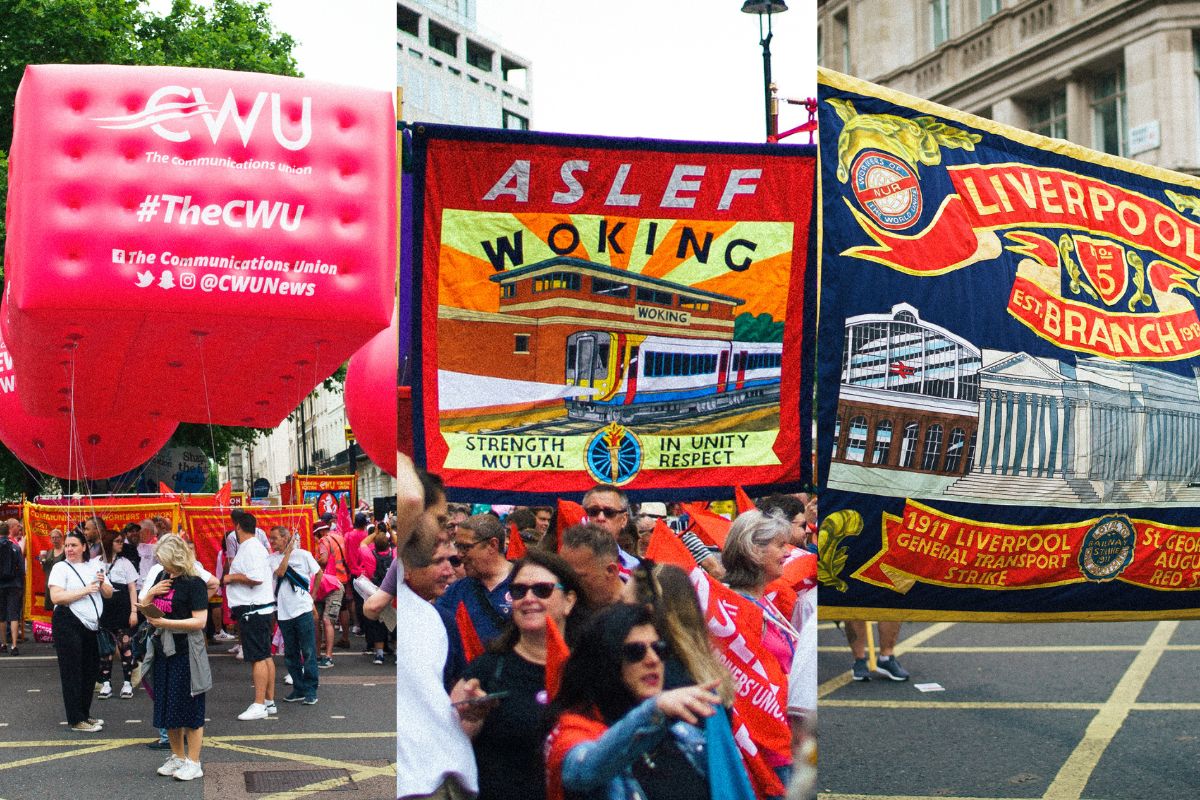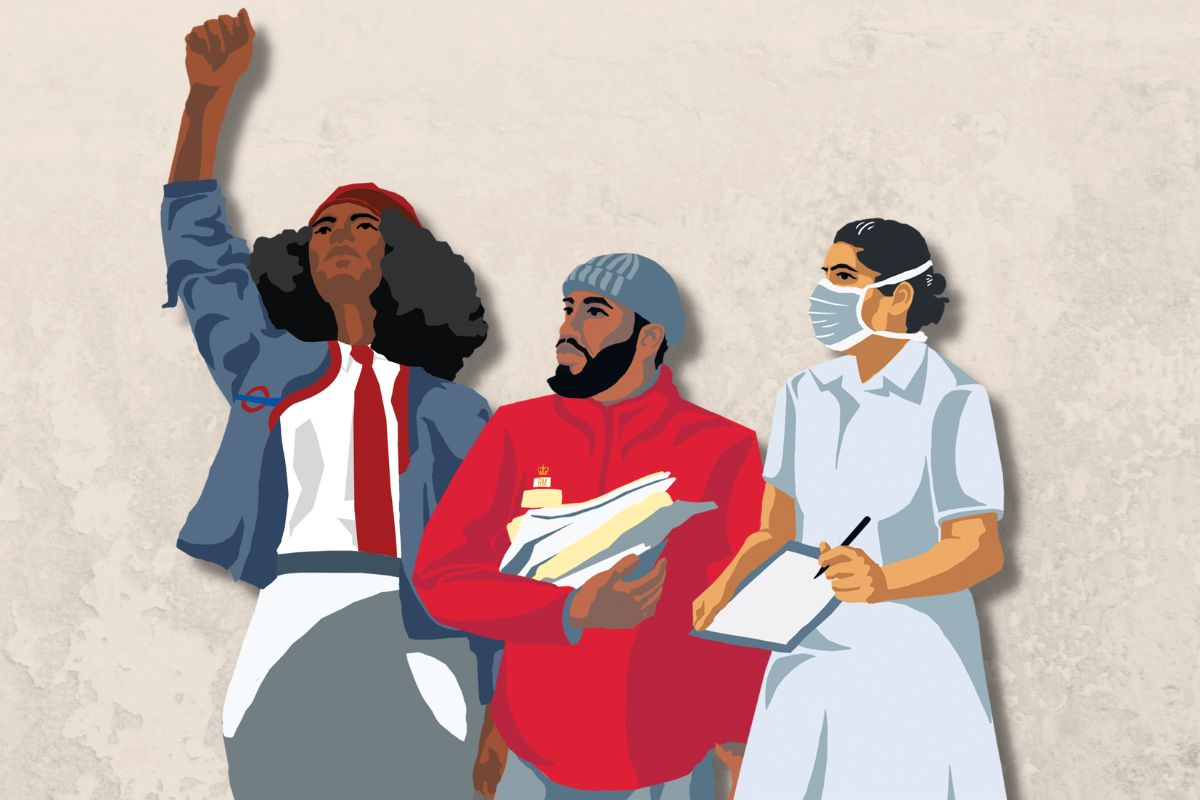This year’s Durham Miners’ Gala – one of the largest in recent memory, with 200,000 attending – and Tolpuddle Martyrs Festival both saw huge numbers. There was a defiant mood at both events amongst rank-and-file trade unionists and workers.
This is no surprise, given that these come at a time when the trade union movement as a whole is finding its feet again.
Yesterday afternoon, for example, the CWU announced that more than 115,000 Royal Mail workers will be out on strike, following an overwhelming 97.6% vote in favour of action, on a 77% turnout.
Similarly, the RMT is set to bring 40,000 members out again on 27 July, 18 August and 20 August.
These traditional labour movement rallies, therefore, as well as paying respects to past struggles, were also firmly looking forwards at the approaching class battles.
There is a growing recognition across the labour movement that “the working class is back”; and, in the words of RMT general secretary Mick Lynch, that “we refuse to be poor any more.”
“We’re back. The working class is back. We refuse to be meek, we refuse to be humble and we refuse to be poor anymore.” RMT Secretary-General Mick Lynch at #DurhamMinersGala…@ChronicleLive #photography #MickLynch #Solidarity #photojournalism #Durham https://t.co/jidxqseZSd pic.twitter.com/s3S4OwAC91
— Craig Connor (@ConnorReachPLC) July 9, 2022
Militant action

This has not gone unrecognised by the ruling class. Whilst Tory leadership candidates tear into each other over taxes and toilets, there is one thing that unites them all: their anti-worker agenda.
In an attempt to nip this developing strike wave in the bud, on 11 July, the government passed a bosses’ charter that effectively legalises the use of agency workers as scabs. This is deliberately designed to weaken the effectiveness of strike action, especially in important sectors such as transport.
Such an assault on the right to strike is not a surprise. Indeed, more should be expected. But it is up to the trade union leaders whether such laws will be respected or smashed.
According to Unite general secretary Sharon Graham, speaking in an interview with the Morning Star at the Durham Miners’ Gala, “brains as well as brawn” are needed. We agree.
Using brains as well as brawn, however, should also mean thinking about how industrial action can increase the confidence of the working class to change society, as well as win individual disputes.
It also means picking the right tactics. In the coming years, it may be necessary for the labour movement to readopt hard pickets and illegal strike action, so that workers can defend their right to withdraw their labour and fight for their interests.
Such militant methods are what’s required in an age of capitalist decline, where even the most basic necessities – such as eating and heating – are under serious threat for the working class.
As Mick Lynch put it at the Gala: “The Tories and their friends are ruthless in their pursuit of profit…We have to be ruthless in our pursuit of justice for the working class.”
Pay rises

Rampant inflation – coming on top of 10 years of stagnant real wages – is the straw that has broken the camel’s back, unleashing this strike wave.
Almost all of these union disputes, either wholly or partly, are over the question of pay. And no wonder, with inflation now officially at 9.4%.
Even this headline figure hides the reality facing working-class households, with the price of everyday goods like pasta rising by 50%; and a tub of butter in some supermarkets now costing an eye-watering £9.
Despite this, both the bosses and the Tory government continue to offer below-inflation pay rises – that is, pay cuts in real terms.
For the bosses, this is an effort to shore up and maximise their profits. For the Treasury, it is a chance to tighten the purse-strings on spending, given the monumental levels of public debt.
Unions across the public sector have already declared that they will be rejecting the government’s latest pathetic pay offer, which outlines rises of just 4% and 5%, respectively, to NHS nurses and teachers.
This means that further strikes are certainly on the way, as workers fight to hold onto what they have, and to regain what they’ve lost.
Already, PCS has set the dates for a civil-service-wide ballot in September. The NEU has also confirmed that teachers will be balloted in the autumn. And the new chair of the BMA has even stated that a doctors’ strike is inevitable.
Sliding scale
Some important victories have already been achieved. In Unite, for example, certain disputes have seen workers winning big wage rises.
Inflation is expected to rise even further in the autumn, however. And who knows what next year will bring? It is therefore vital that the unions fight for pay rises fixed to the rate of inflation, and not just for one-off lump sums or year-long deals.
The trade union movement as a whole should demand a sliding scale of wages, with pay linked to prices, so that such victories are not ‘here today, gone tomorrow’.
Such a measure was won by the workers’ movement in postwar Italy, for example. And there is no reason a similar demand cannot be won here too, if the trade unions are willing to organise and fight for it.
Coordinated action

Given how many unions are set to be taking action over the coming months, it is vital that these struggles are not isolated, but are coordinated.
The trade union leaders therefore need to genuinely think and plan as a united workers’ movement, not as individual unions engaged in separate battles.
As Sharon Graham herself said to the Morning Star at the Gala: “How can we connect these industrial disputes? How can we connect outside Unite, with what the RMT are doing, Unison, the CWU?”
Coordinated action, including a public-sector-wide strike, is inherent in the situation.
With the Tories in crisis, such a step, combined with mass demonstrations in every city and town, has the potential to force a general election and bring down this degenerate government of crooks and charlatans.
Socialist programme

This would also pose the question of a political programme – a programme of class demands that can unite the entire labour movement, and offer a genuine alternative to inflation, austerity, and capitalist crisis.
The TUC has put forward a ‘New Deal’ charter. But the tepid demands within it fall far short of what is required. At the same time, the TUC leaders are not using the collective industrial might of the trade union movement to fight for real change.
As part of a militant strategy of coordinated action, the trade unions should therefore be fighting for a programme of bold socialist policies, including the nationalisation of the big banks and major monopolies; expropriating the billionaires and using their wealth to produce for need, not profit.
Such a programme is what the Marxists are fighting for, in the labour movement and on the streets. This is the task posed by history. Nothing short of the socialist transformation of society will do.
Model motion for TUC Congress
This Congress notes the Tory government is in a state of crisis, at a time when working people are experiencing a cost-of-living catastrophe.
Inflation is soaring, including rising energy bills, putting a squeeze on working people like never before. This comes on top of a decade of falling real wages and austerity.
At the same time, CEO pay has returned to pre-pandemic levels, and many companies are reporting record profits.
This Congress also notes the rise in industrial disputes that our affiliated unions are engaged in, including significant strike action being taken nationally by the RMT and CWU, amongst others.
This Congress believes that, given the generalised crisis facing the working class, coordinated action must be used across unions and industries, as part of a joint strategy to fight the bosses and Tories as a united movement.
This should include united action in the public sector over pay, starting with a one-day public-sector-wide strike. Mass demonstrations in every town and city should also be organised to coincide with this, demanding a general election in order to kick out the Tory government.
This should be linked to the fight for a socialist political programme, with an updated ‘New Deal for Working People’ to include the following demands:
- A sliding scale of wages, linking pay rises to inflation.
- The reversal of all privatisation and outsourcing in the NHS, with services run under the control of healthcare workers.
- The repeal of all anti-trade union laws.
- A mass programme of council house construction, building one million homes a year.
- Nationalisation of the big banks and top 150 monopolies, without compensation.
- A planned economy, run democratically by workers in the interests of people not profit.






